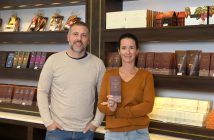Thanks to its easy access, Tiny House can produce bean to bar chocolates with cacao from the most diverse producer countries, including Brazil
Maiana Lasevicius, 30 and Gustavo Hilsdorf, 37, are two Brazilians, advertisers, students at Cásper Líbero and FAAP, respectively, who worked in São Paulo, in strategic planning at renowned agencies. Tired of the stressful life of the city and their work, about four years ago, they decided to try life in another country, not knowing very well how they would survive.
They chose the US because Gustavo was born in New Jersey and was entitled to the American passport. And in 2010, he spent three months in the country visiting friends and liked what he saw.
They went straight to sunny California and chose to live in a small town, Santa Cruz, an hour and a half away from San Francisco. The place has about 55 thousand inhabitants and is known for housing people from all over the world, with a large Brazilian, Mexican and Chinese community, among other nationalities. “Basically, we started a new life, from scratch,” says Gustavo, who asked Maiana to marry on the beach and decided to establish housing in the city.
Maiana’s father, Bruno Lasevicius, owner of Casa Lasevicius, www.casalasevicius.com.br, at the time the couple moved to the US, was beginning to make Bean to Bar chocolates in Brazil and gave them the hint. “I loved it, because in Brazil, I sort of helped my dad produce it, and he also sold it at the agency I worked at. When I moved here, I was sad for not being able to collaborate any longer,” says Maiana.
In the onset in Santa Cruz, Gustavo had to fend for himself with what he painted. He worked as a bricklayer, as a laborer on the production of a candy factory, and then in a printer, where he still acts as a designer, dedicating himself to the packaging industry.
Maiana took the idea of her father seriously and began producing the Bean to Bar chocolates. At that time, Bruno went to visit them and urged them to buy the first equipment for manufacturing chocolate. “He even helped the whole process, with the techniques, the money, in the formulation of the first recipes and in the choice of machinery. He was a real daddy,” she says proudly says.
At the same time, in order to survive, Maiana worked until September last year, in a Brazilian restaurant, where she improved her English and knowledge about the locals.
Tiny House
By 2015, they began to formulate their own recipes. The first product was a 70% Vitnam chocolate bar, which was quite successful. In 2017, at last, they created the brand and began to formulate real recipes, with or without inclusion, always with original cocoa. And, last year, they started selling it for real. “Tiny House is a vegan brand which does not make use of anything derived from animals; it is organic, it appreciates the way we treat cocoa and it is gluten free,” explains Maiana, the chocolatier. “And we have the mission of disclosing the Brazilian original cacao in the American market,” adds Gustavo.
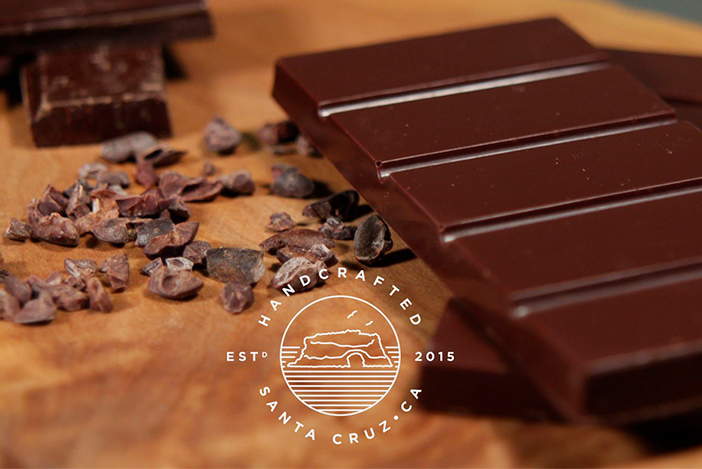
70% Vitnam chocolate bar
The name, Tiny House, was created by thinking of the small house where they live. “In California, we have a life unattached to material things. We cherish the quality of ingredients and preach a basic existence. This is also the concept of our company,” says Gustavo. “We use handcrafted products, we preserve the artisanal way of production, we are minimalistic in communication and packaging. Fewer walls, more horizon,” adds Gustavo.
The packaging
Both the brand creation and the packaging required hard work. After all, as two former advertisers, the couple noticed themselves as their worst customers. “We are always improving, changing, modifying; we are really dreadful customers. The packaging was a delivery. I created a folding, with no glue, to make the process cheaper and to allow us to create and sell new flavors quickly. It was an engineering process to think about the bar size, the amount of colors, anyway. But we managed to reach an awesome solution,” he believes.
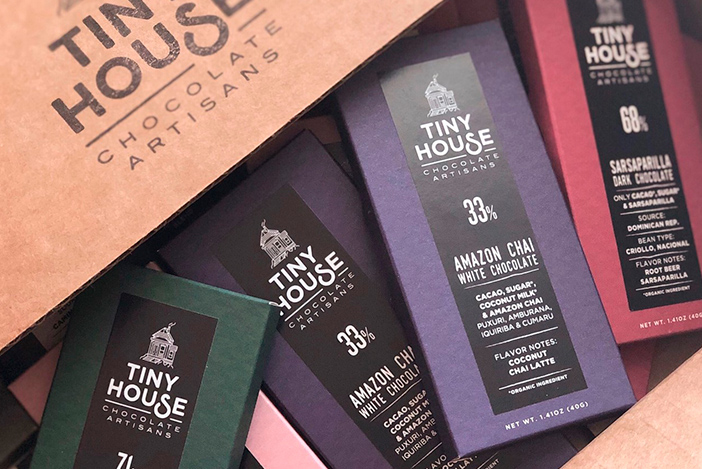
packaging
Product line
Currently, they offer 14 flavors, six of which are cocoa only, with no inclusion, such as Brazil 70% Lagedo de Ouro, Amazon 71%, Espírito Santo 75%, Tanzania 71%, Ecuador 80%, and India 67%. And those with an inclusion, Salsaparilla 68%, Earl Gray 70%, Arabica Coffee 68%, Yerba Mate 70%, White Vegan Coconut 33%, Amazon Chai 33%, White Yerba Mate 33% and Lemongrass 70%.
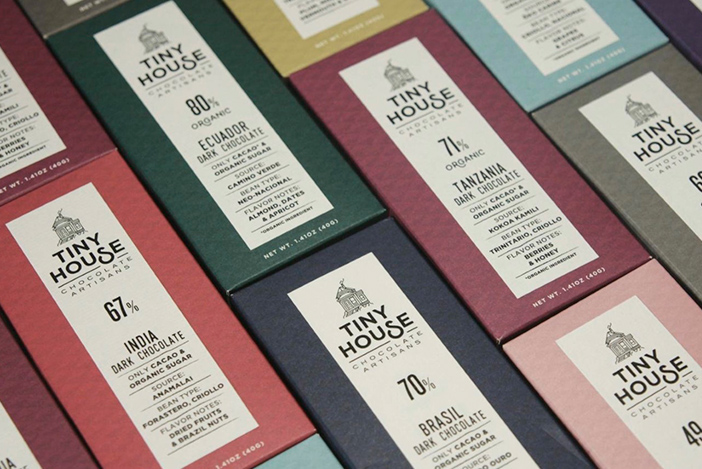
14 flavors offered
They sell their 40-gram bars without inclusion at US$ 7 and those with inclusion at US$ 8 and the seven stores that resell their chocolates charge, on average, US$ 10. “We are in gift shops that have a special curation of homecare products. It is not our intention to sell in large networks or in supermarkets,” explains Gustavo.
Tiny House produces about 50 kg of bean to bar chocolates per month. “We were very lucky because the appeal that dark chocolate has here in California is really great. For them, “the darker, the better”, the higher the percentage of cocoa, the better. People have a healthier lifestyle, with not too many obese people around, as in the rest of the US. Few people smoke around here as well. But at the same time, they are not yet familiar with the term bean to bar. Here, even little babies eat 70% chocolate, which in Brazil is unthinkable. Amazingly enough, there are many people who think that chocolate comes from cows and do not know that it is a fruit. When they find out that our chocolate is still vegan, the crowd goes crazy,” says Maiana.
In the near future, they intend to build their own factory that must be attached to a brand physical store. “We have rented an industrial kitchen for US$ 20 an hour, which came in handy, but part of the production is done at home”, explains the chocolatier.
Moreover, they intend to increasingly explore the by-products of cocoa to produce their own cocoa butter, nibs and whatever else is possible. “We wish to be a company with zero waste and full reuse of products, which is a local requirement”, they say.
Selling their Bean to Bar chocolates in Brazil is also on the business radar. “We have no ecommerce yet, but we are working for it at the moment, besides looking for points of sale in some cities in the country. Soon, Brazilians will also be able to taste our chocolates”, the couple promises.
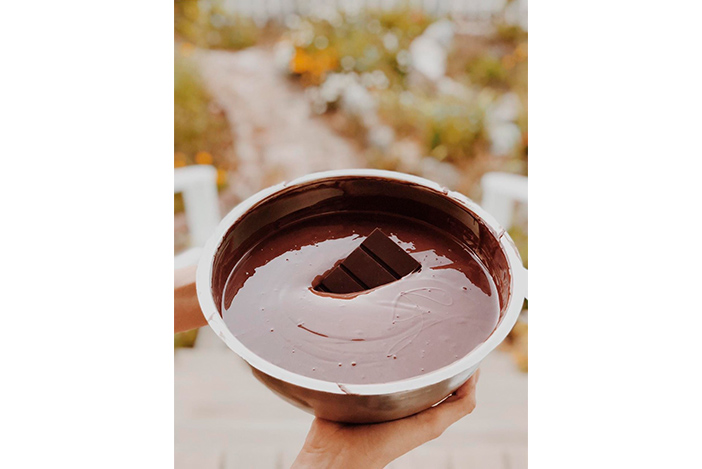
Bean To Bar chcolate – Vegan
For the time being, the passion for Bean to Bar Chocolate in the South of Ecuador will have to be content in acquiring the brand bars in the following business points:
Em Santa Cruz, Califórnia
Luma Yoga – 1010 Center Street www.lumayoga.com
The Point Market – 23040 East Cliff Drive facebook.com/ Point Market and Cafe
Mini Mint – 3912 Portola Drive www.minimintstudio.com
Em Felton, Califórnia
Mountainside General Store – 6235 Hwy 9 www.montainsidemade.com
Em São José, Califórnia
Hapertas&Co – 60 N San Pedro Street www.hapertasco.com
Em São Francisco, Califórnia
Chocolate Covered SF – 4069 24th Street www. Chocolatecoveredsf.com
Earthen -136 Fillmore Street www.earthen-shop.com


